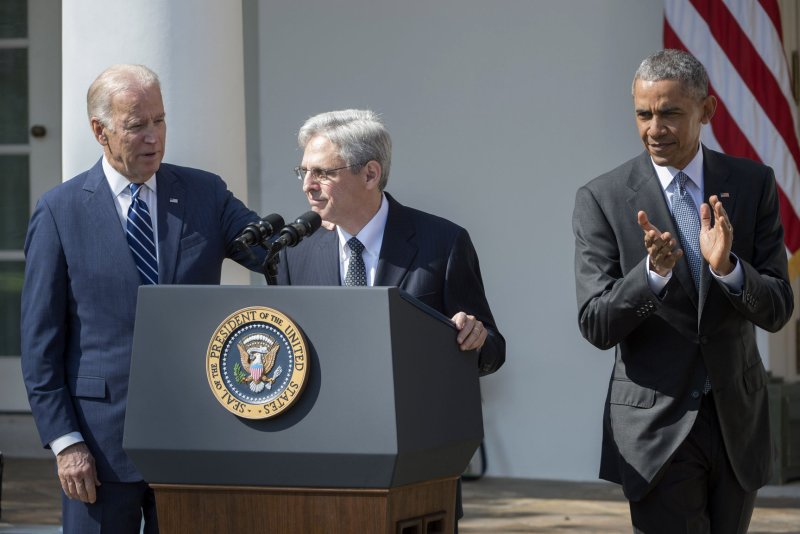Supreme Court nominee Merrick Garland is congratulated by U.S. Vice President Joe Biden in the White House Rose Garden on March 16, 2016. Thursday, Biden criticized Republicans for refusing to offer any hearing to Garland, a Washington, D.C., appellate judge, and for erroneously citing remarks the former Delaware senator made in 1992 about presidential nominations in election years. Photo by Pat Benic/UPI |
License Photo
WASHINGTON, March 24 (UPI) -- U.S. Vice President Joe Biden is tired of Republicans trying to use his past against him in the current fight over a replacement justice for the Supreme Court.
In an address at Georgetown University's law school Thursday afternoon, Biden waded into the discussion -- which has been at the heart of GOP inaction concerning President Barack Obama's high court appointee, Washington, D.C., appellate judge Merrick Garland.
Republican leaders, including Senate Majority Leader Mitch McConnell, have cited the so-called "Biden rule" -- remarks Biden made in 1992 -- as part of their reasoning for refusing Garland a confirmation hearing.
"There is no Biden rule," the vice president told a crowd of law students Thursday. "Frankly, it's ridiculous."
"There's only one rule I ever followed ... that was the Constitution's."
The "Biden rule," according to Republicans, is an argument the vice president made 24 years ago, when he was Senate Judiciary Committee chairman, that the upper chamber has the right to refuse a president's nominee -- particularly in an election year.
"It is my view that if a Supreme Court justice resigns tomorrow or within the next several weeks ... President [George H.W.] Bush should consider following the practice of a majority of his predecessors and not -- and not -- name a nominee until after the November elections are completed," Biden said in his 1992 Senate floor discourse. "If the president .. presses an election year nomination, the Senate Judiciary Committee should seriously consider not scheduling confirmation hearings on the nomination until after the political campaign season is over."
While Biden's old remarks have given Republicans ammunition in the fight, he says that argument has been misinterpreted out of context -- and that he was only criticizing the politicization of the high court nomination process.
The vice president added that his committee gave a hearing to every nominee former president Bush submitted to it.
Supreme Court nominee Merrick Garland is seen as he talks with Sen. Charles Schumer, D-N.Y., as they walk to a meeting in Washington, D.C., on Tuesday. Senate Republicans have vowed to block any nominations to the high court until a new president is in office. Photo by Kevin Dietsch/UPI
"Back in 1992, after a bruising, polarizing confirmation process involving Clarence Thomas, who had been nominated by President Bush with no consultation just four days after the great [Justice] Thurgood Marshall had retired, I took to the Senate floor to speak about the Supreme Court nominating process," Biden said Thursday. "Senate majority leader, and he's my friend, Mitch McConnell, and other Republicans today, have been quoting selectively from the remarks that I made in an attempt to justify refusing chief judge Garland a fair [confirmation] hearing and a vote on the floor of the Senate."
"They completely ignore the fact that, at the time, I was speaking of the dangers of nominating an extreme [Supreme Court] candidate without proper Senate consultation," he continued. "They completely neglected to quote my unequivocal bottom line, so let me set the record straight, as they say. I said, and I quote, 'if the president consults and cooperates with the Senate or moderates his selections, then his nominees may enjoy my support.' I made it absolutely clear that I would go forward with the confirmation process ... even a few months before a presidential election."
Biden said he has always been consistent in his advocacy of the Constitution's stipulation of "advise and consent" between the White House and Senate when it comes to the nomination of a high court justice.
"I was responsible for eight justices and nine total nominees to the Supreme Court -- more than anyone alive," he said. "Some I supported. Others I voted against. But in all that time, every nominee was greeted by committee members. Every nominee got a committee hearing. ... Every nominee, including Justice Kennedy in an election year, got an up-and-down vote."
"Chief Judge Garland deserves a hearing, just as a simple matter of fairness" Biden added. "It's also about the Senate fulfilling its constitutional responsibility.
The vice president also warned that the stalling of Obama's nomination has potential repercussions that could spread beyond U.S. borders.
"The world looks at this city, right now, as dysfunctional. And that's a problem," Biden added, with a long pause separating the sentences. "And it would be even more of a problem if it spreads beyond the Congress. ... What Republican senators say they will do, in my view, can lead to a genuine constitutional crisis, born out of the dysfunction of Washington.
"The bonds that held our diverse republic together for the past 229 years are being frayed, and you all know it -- whether you're Democrat, Republican, liberal, conservative. Everybody knows it. The world knows it."
















